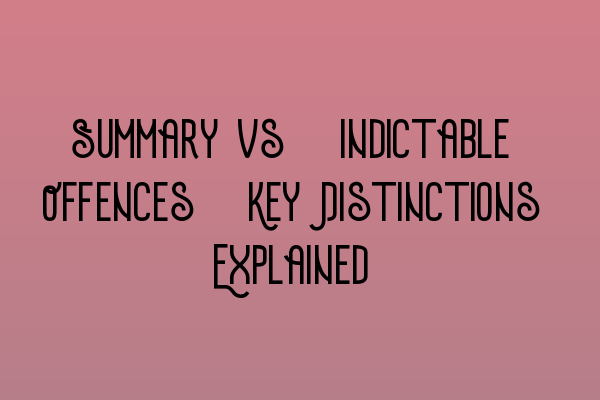Summary vs. Indictable Offences: Key Distinctions Explained
In the legal system of the United Kingdom, offences are broadly categorized as either summary offences or indictable offences. These classifications play a crucial role in determining the procedures followed, the potential punishments and the courts that handle the cases.
Summary Offences
Summary offences are less serious criminal offenses that are typically dealt with in the lower courts, such as the Magistrates’ Court. They do not require a jury trial and are often heard and determined by a magistrate or a panel of magistrates.
Examples of summary offences include minor assaults, petty theft, public disorder offenses, and driving offenses that do not result in serious harm or death.
When charged with a summary offence, it is essential to seek legal advice and representation. SQE Criminal Law & Practice Law UK offers comprehensive SQE 1 Preparation Courses that cover all aspects of criminal law to help aspiring solicitors succeed in their careers.
Indictable Offences
Indictable offences are more serious criminal offenses that are usually heard in the Crown Court. These offenses often carry higher penalties and are subject to trial by jury, where a panel of twelve members of the public determines the guilt or innocence of the accused.
Examples of indictable offences include murder, manslaughter, serious fraud, large-scale drug trafficking, and sexual offenses.
If you are preparing for the SQE exams, it is crucial to have a solid understanding of both summary and indictable offences. SQE Criminal Law & Practice Law UK offers reliable SQE 2 Preparation Courses where you can learn the intricate details of criminal law and gain the skills necessary to perform well on the exams.
Distinctions and Factors to Consider
When determining whether an offence is summary or indictable, several factors are considered:
- Severity of the offence
- Potential penalties
- Complexity of the case
- Evidence requirements
- Legal procedures
These factors help in categorizing the offence and determining the appropriate court process.
If you are facing criminal charges or require legal advice, it is essential to consult an experienced solicitor specializing in criminal law. SQE Criminal Law & Practice Law UK provides expert legal services and guidance to individuals involved in criminal cases.
Conclusion
Understanding the distinctions between summary and indictable offences is crucial for both aspiring solicitors and individuals facing criminal charges. While summary offences are less serious and usually handled in lower courts, indictable offences carry higher penalties and are tried in the Crown Court. Choosing the right legal representation and having a strong foundation in criminal law are vital to navigating the complex legal landscape.
If you want to test your knowledge of criminal law and prepare for the SQE exams, make sure to check out SQE 1 Practice Exam Questions and SQE 1 Practice Mocks FLK1 FLK2. These resources will help you assess your understanding and improve your performance.
For more information about the SQE exams and important dates, visit the official site for SRA SQE Exam Dates.
